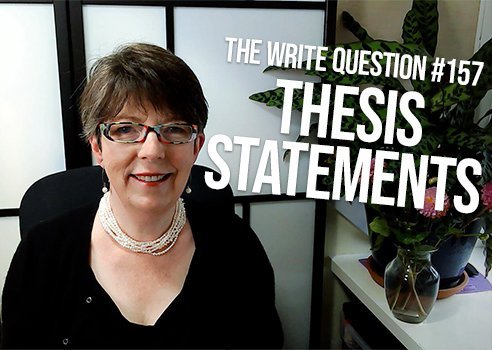Viewing time: 4 mins 24 secs
The Write Question is a weekly video podcast about writing that I started in 2017 and that ran, more or less weekly, until April 2022. This is a republication of issue #157, which addresses how to find a thesis statement. The post first ran on Oct. 2/20.
Transcript:
How do you find your thesis statement? That’s the topic I’m addressing today in The Write Question. I’m Daphne Gray-Grant, the Publication Coach, still in pandemic mode.
I have a question from Marie Calibre, a grad student based in San Diego, California. Here’s what she’s asked by email….
“With academic writing, how do you home in on the premise of your work? I’m writing a master’s thesis and I’m having a hard time identifying my ‘thesis statement.’ Do you have any suggestions for me?”
Thanks for your question, Marie. For people who aren’t familiar with academic practices, let me begin by giving a definition. A thesis statement is a sentence or short paragraph summarizing the main point of an essay or research paper. In fact, “thesis” is a Greek word meaning ‘proposition.’ So a thesis statement is really the main point you want to make.
An effective thesis statement needs to do three main things:
- It must be very specific and debatable
- It must be appropriate to the type of paper you’re writing
- It must appear within the first section of your text so that it is clear to your reader what the paper is about
Here, for example, is a weak thesis statement:
Shakespeare was the leading playwright of the last 500 years.
Notice that this statement is quite non-specific and, for many people, would hardly be debatable. In fact, if you wanted a better statement, you might propose something like, “Edward Albee [see link in the show notes] is the leading playwright of the last 500 years.” At least it’s a surprising argument!
Anyway, before constructing your thesis statement, you need to do some significant research. Read some good overview literature in your subject area so that you’re really familiar with it.
Once you have a basic understanding of the broad subject area, I suggest you start mindmapping to identify possible thesis statements. I’ve written lots of blog posts and done a number of videos on mindmapping. See links in the show notes below.
But let me emphasize one point about mindmapping that will make a big difference to you. DON’T just write the topic in the centre of the page. Instead, be sure to use a question.
The act of writing a question will force you to become much more specific, which will be helpful to you as you work to identify your thesis statement.
Also understand that it’s perfectly fine to ask yourself a ‘meta’ question like, “what’s an interesting thesis statement I could use for my paper?”
Keep in mind that you may change the thesis statement several times as you work on the paper. This is normal and expected because the more you work with your topic, the more familiar you will become with the major issues involved.
You might even find that you want to argue in the opposite direction – and that’s okay as well. Writing a paper is a creative process and not one that always proceeds in a predictable way.
Finding a good thesis statement is probably the most important — and most challenging — part of writing a paper. But when you get a good one, it will make the work of writing that paper so much easier!
Finally, let me wrap up with a quote from the American poet Jenny Zhang:
“Sometimes I worry that people who read my fiction think that I am making some kind of thesis statement.”
Marie, while poets don’t have to worry excessively about thesis statements, academic writers really need to. Take the time to find one that’s going to work for you. It’s well worth the effort.
*
If you’d like to learn more about how to make writing a happier and more rewarding process, check out my latest book Your Happy First Draft. I don’t sell it in bookstores or via Amazon. The only place to buy it is on my website, link on the screen below and in the show notes.


